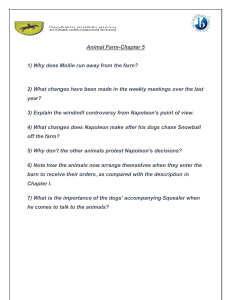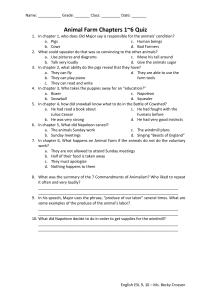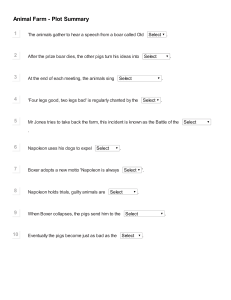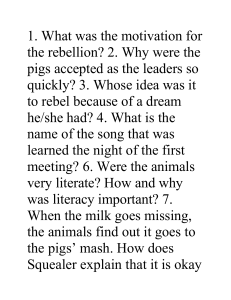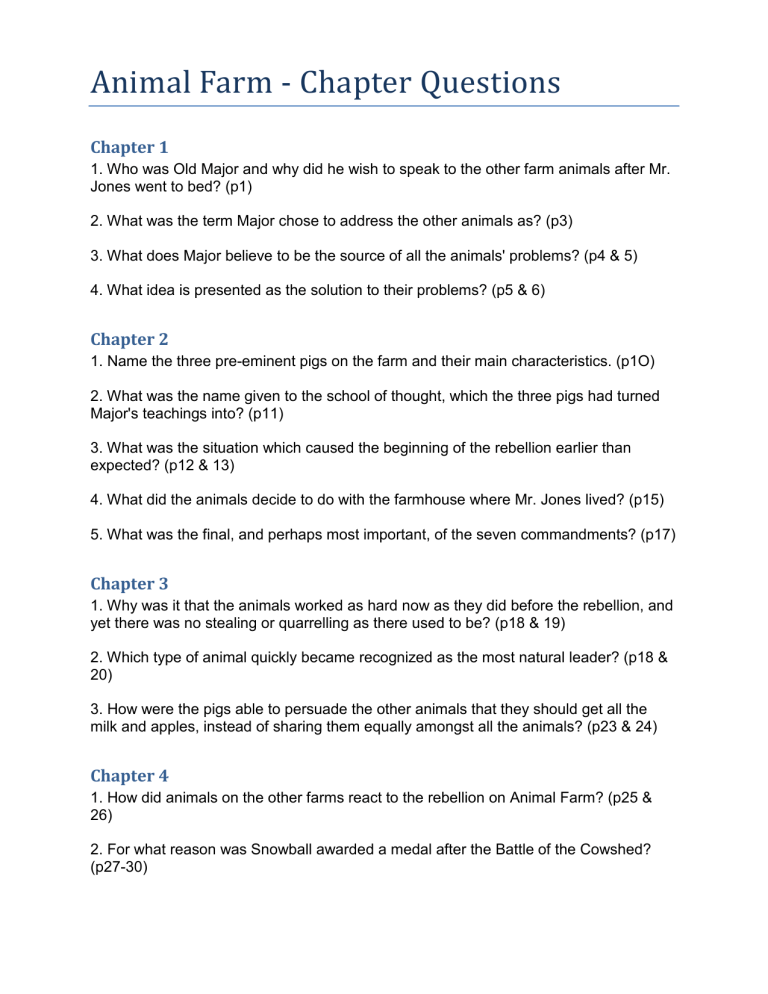
Animal Farm - Chapter Questions Chapter 1 1. Who was Old Major and why did he wish to speak to the other farm animals after Mr. Jones went to bed? (p1) 2. What was the term Major chose to address the other animals as? (p3) 3. What does Major believe to be the source of all the animals' problems? (p4 & 5) 4. What idea is presented as the solution to their problems? (p5 & 6) Chapter 2 1. Name the three pre-eminent pigs on the farm and their main characteristics. (p1O) 2. What was the name given to the school of thought, which the three pigs had turned Major's teachings into? (p11) 3. What was the situation which caused the beginning of the rebellion earlier than expected? (p12 & 13) 4. What did the animals decide to do with the farmhouse where Mr. Jones lived? (p15) 5. What was the final, and perhaps most important, of the seven commandments? (p17) Chapter 3 1. Why was it that the animals worked as hard now as they did before the rebellion, and yet there was no stealing or quarrelling as there used to be? (p18 & 19) 2. Which type of animal quickly became recognized as the most natural leader? (p18 & 20) 3. How were the pigs able to persuade the other animals that they should get all the milk and apples, instead of sharing them equally amongst all the animals? (p23 & 24) Chapter 4 1. How did animals on the other farms react to the rebellion on Animal Farm? (p25 & 26) 2. For what reason was Snowball awarded a medal after the Battle of the Cowshed? (p27-30) Chapter 5 1. What happened to Mollie after she was accused of being friendly with the men on the neighboring farm? (p31 & 32) 2. How did Napoleon and Snowball differ in their ideas about running the farm? (p32 & 33) 3. What were the two issues that the animals had to decide between when it came time to vote to have a windmill or not? (P34 & 35) 4. What freedom, or privilege, did Napoleon take away from the other animals after his dogs chased Snowball off the farm? (P37) 5. Why did the animals accept Squealer's explanation for Napoleon's change of mind about the windmill without any questions? (p39 & 49) Chapter 6 1. How were the animals "rewarded" for their hard labour? (P41) 2. Why had Napoleon decided to engage in trade with the other farms in the area? (P43) 3. How did Squealer convince the animals that no rule against trade with the humans had ever existed? (p44 & 45) 4. How had the rule, about animals sleeping in beds change, when the pigs moved into the farmhouse? (P46) 5. Who did Napoleon blame for the destruction of the windmill? (p48 & 49) Chapter 7 1. Why was it important for the animals to conceal their food shortages from the outside world? (p50 & 51) 2. How was Napoleon able to convince the other animals that Snowball was a total traitor? (p53 & 54) 3. Which animal did Napoleon's dogs attack without warning? (p57) 4. Why was the slaughter of the animals, who confessed to being traitors especially horrifying to the other animals? (p57 & 58) 5. Why did Napoleon ban the singing of "Beasts of England"? (p60 & 61) Chapter 8 1. How had Napoleon further set himself apart from the other animals? (p62 & 63) 2. Why were the animals especially afraid of Mr. Frederick from Pinchfield Farm? (p65 & 66) 3. Who did Napoleon sell the farm's excess wood to? (p67) 4. In what three ways did Mr. Frederick prove himself to be an enemy of the animals? (p69 -71) 5. What did the pigs discover in the basement of the farmhouse after the Battle of the Windmill? (p73) Chapter 9 1. Why did the animals believe that, in spite of the hard work and little food, life was better for them now than when Jones was master of the farm? (p77) 2. How did Napoleon trick the animals into forgetting how hard life was for them? (p79 & 80) 3. What was the cruel trick played on Boxer when he fell ill and needed the help of his fellow animals the most? (p82 - 84) Chapter 10 1. Several years after the animals began running Animal Farm, they worked just as hard as they had at the beginning. What did Napoleon declare to be better than the comfortable stalls and three day work week they had all been promised at the beginning? (p85) 2. What had the pigs learned to do which made them even more like man and less like animals? (p91) 3. Why did the animals have further reason to fear the pigs? (p92 & 93) 4. What did the animals discover when they peeked in the farmhouse window and watched the men and the pigs arguing over a card game? (p97)
